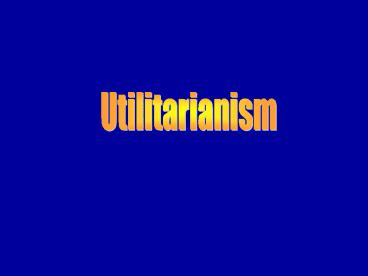Utilitarianism - PowerPoint PPT Presentation
1 / 32
Title:
Utilitarianism
Description:
Three ways of responding to crime: Retribution. Deterrence. Rehabilitation. Retribution. Pay the S.O.B. back for his wicked deeds. Why? Because he deserves it. ... – PowerPoint PPT presentation
Number of Views:43
Avg rating:3.0/5.0
Title: Utilitarianism
1
Utilitarianism
2
Utilitarianism
Jeremy Bentham (1748-1832)
John Stuart Mill (1806-1873)
3
Utilitarianism
The ultimate moral principle is the Principle of
Utility The right thing to do, in any
situation, is whatever would produce the best
overall outcome for all those who will be
affected by your action.
4
Utilitarianism The greatest happiness for the
greatest number
- The right thing to do is whatever would have the
best overall consequences. - Which consequences matter? Whats important is
human welfarewe want people to be as well-off as
possible. - Each persons welfare is equally important.
5
Utilitarianism
Some practical implications
- Abolition of slavery equal rights for women
abolition of child labor
6
(No Transcript)
7
Utilitarianism
Some practical implications
- Abolition of slavery equal rights for women and
minorities abolition of child labor - Prison reform deterrence and rehabilitation, not
vengeance
8
Three ways of responding to crime
- Retribution
- Deterrence
- Rehabilitation
9
Retribution
10
Deterrence
11
Deterrence
12
Deterrence
13
Deterrence
14
Deterrence
15
Deterrence
16
Deterrence
17
Deterrence
18
Deterrence
19
Deterrence
Attach penalties to certain sorts of actions.
20
Deterrence
Why?
21
Deterrence
So that people wont do them.
22
Rehabilitation
23
- Consequences of Rehabilitationism
- Changes in nomenclature
- Indeterminate sentences
- Parole system
- Different punishments for different offenders
24
Utilitarianism
Some practical implications
- Abolition of slavery equal rights for women and
minorities abolition of child labor - Prison reform deterrence and rehabilitation, not
vengeance - We have extensive charitable duties.
25
Peter Singer is a utilitarian philosopher.
26
Utilitarianism
Some practical implications
- Abolition of slavery equal rights for women and
minorities abolition of child labor - Prison reform deterrence and rehabilitation, not
vengeance - We have extensive charitable duties.
- Mercy-killing can sometimes be permissible.
27
(No Transcript)
28
- The Utilitarian argument for mercy-killing
- Any action that prevents suffering is morally
acceptable, provided that it does not cause
greater suffering somewhere else. - In some instances, providing a dying person with
a quicker death, at his or her own request, will
prevent considerable suffering, without causing
anyone else to suffer. - Therefore, in at least some instances,
mercy-killing is morally acceptable.
29
Utilitarianism
Some practical implications
- Abolition of slavery equal rights for women and
minorities abolition of child labor - Prison reform deterrence and rehabilitation, not
vengeance - We have extensive charitable duties.
- Mercy-killing can sometimes be permissible.
- Animals count, too.
30
(No Transcript)
31
Human Pain
Animal Pain
32
The Utilitarian argument that we shouldnt eat
meat
- 1. We should not cause unnecessary pain and
suffering. - 2. In the modern meat-production business,
animals are caused great suffering. - 3. This isnt necessary, because we could nourish
ourselves without doing it. - 4. Therefore, we should stop doing it. We should
be vegetarians instead.






![❤️[READ]✔️ Utilitarianism PowerPoint PPT Presentation](https://s3.amazonaws.com/images.powershow.com/10049602.th0.jpg?_=20240607040)
![❤️[READ]✔️ Utilitarianism PowerPoint PPT Presentation](https://s3.amazonaws.com/images.powershow.com/10048778.th0.jpg?_=20240606019)























